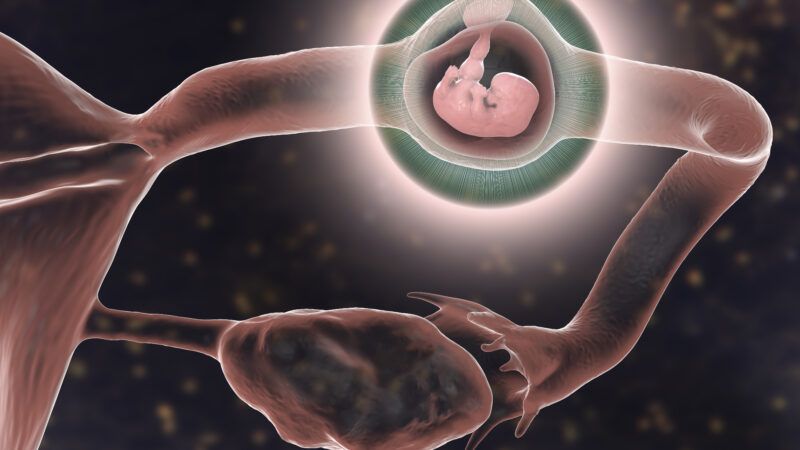Missouri Lawmaker Behind Confusing Abortion Bill Says He'll Clarify Ban on Ending Ectopic Pregnancies
But the bill is still a mess.

A bill under consideration in Missouri would make "trafficking abortion-inducing devices or drugs" a crime. While many attempts to ban abortion go after doctors performing surgical abortions or prescribing abortion pills, this one is much broader, targeting any person or entity that "knowingly imports, exports, distributes, delivers, manufactures, produces, prescribes, administers, or dispenses" any "instrument, device, medicine, drug, or any other means or substance to be used for the purpose of performing or inducing an abortion on another person in violation of any state or federal law."
The legislation—introduced by Rep. Brian Seitz (R–Branson)—is one of several new anti-abortion measures under consideration in the Missouri legislature. Another bill, S.B. 778, would ban abortion after fetal cardiac activity can be detected and would allow private citizens to sue offenders (à la the Texas bill passed last year).
But Seitz's bill (H.B. 2810) has been garnering the most national news, owing to a provision concerning ectopic pregnancies.
The bill says that trafficking in abortion drugs or devices would generally be a class B felony but under certain circumstances would be a class A felony, which carries a minimum sentence of 10 years. The more serious penalty would apply when an offense involved three or more women, a pregnancy past 10 weeks' gestational age, a victim of human trafficking, or a second or subsequent offense. It would also apply when an abortion is "performed or induced or was attempted to be performed or induced on a woman who has an ectopic pregnancy."
An ectopic pregnancy—in which a fertilized egg implants outside the womb—is never viable. It will not develop into a baby, no matter what is done. But without intervention, ectopic pregnancies can be very dangerous for the women suffering from them, leading to internal bleeding, burst Fallopian tubes, future infertility, or death.
If Seitz's bill is passed, it "would literally kill pregnant people," said Vanity Fair.
The fertilized eggs in some ectopic pregnancies will dissolve on their own, but most require further action—either a drug is injected to stop the pregnancy or a surgery is performed. Such interventions are not generally controversial, even among anti-abortion activists. So H.B. 2810 is extreme even by abortion restriction standards, if people are understanding it correctly.
The bill's sponsor claims that many people are misreading the legislation. Seitz told Bloomberg "this bill does nothing to curtail that LEGAL activity, as it can present a clear and present danger to the mother." Rather, it's "designed to curtail the illegal transportation, manufacture, sale, use, etc. of otherwise legal drugs."
The bill's text does specify that "trafficking abortion-inducing devices or drugs" is only a crime when it's done "for the purpose of performing or inducing an abortion on another person in violation of any state or federal law" (emphasis mine). So as long as abortion is legal up to a certain point in Missouri—which it currently is, up to 22 weeks, and longer if a woman's health is at risk—providing drugs or devices to induce an abortion before that point would presumably be OK.
Confusingly, however, the bill singles out aborting pregnancies past 10 weeks' gestation for harsher punishment. If it only applies to abortions that are already illegal, and abortion is legal up to 22 weeks, this framework doesn't make sense.
Perhaps Seitz—who did not respond to Reason's request for comment—is operating under the idea that the state's proposed ban on abortion after six weeks will pass.
But that still wouldn't explain the part about ectopic pregnancies. Since ectopic pregnancies always risk women's health and lives, they would always fall under any exception for the health or life of the mother. The only way the ectopic pregnancy provision's inclusion would seem to make sense was if Seitz is anticipating a future abortion ban that does not contain an exception for the life of the mother and he wants to be extremely clear that nothing changes just because a pregnancy isn't actually viable.
Seitz told Bloomberg that he would be offering an amendment to the bill that clarifies the ectopic pregnancy rules.
The next hearing on the bill is scheduled for March 22.
